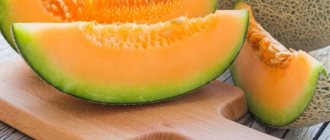Benefits and harms
Advantages of the fetus during the gestational period:
- contains a lot of vitamins: A, C, B1, B6, D;
- useful substances: calcium, phosphorus, copper, magnesium, potassium, zinc, bromelain;
- destroys infections in the intestines;
- helps relieve pain symptoms from varicose veins;
- eliminates heaviness in the stomach;
- reduces flatulence and gas formation;
- cleanses blood vessels from fat accumulations;
- lowers blood pressure;
- folic acid promotes the proper formation of the fetal neural tube;
- saturates the body with vitamins;
- protects nerve cells from destruction;
- has a positive effect on the central nervous system;
- has a diuretic effect.
Pineapple contains useful substances only in fresh form; canned fruit is only a sweet dessert.
In addition to the advantages, the product has the following disadvantages:
- causes allergies if consumed excessively;
- promotes uterine tone, which can provoke premature labor;
- causes an increase in the acidity of gastric juice and contributes to gastrointestinal upset;
- can cause the development of diabetes mellitus, and during pregnancy - gestational diabetes;
- destroys tooth enamel.
Doctors agree that it is better to exclude pineapple in the first and last trimester. The most suitable time is mid-pregnancy. Only fresh fruit and small portions are allowed. Before taking, you should consult your doctor.
Composition of pineapple
The birthplace of pineapple is considered to be Brazil, a warm country on the distant South American continent. The sweet tropical fruit was brought to Europe by sailors in the 15th century. The plant did not take root in the harsh European climate, and it was decided to grow it in Asian and African colonies. To this day, pineapple grows in the tropical regions of South America, the Philippines and some other countries with a favorable climate.
Pineapple contains the following substances:
- vitamins: A, group B, C and PP;
- mineral elements: iron, copper, calcium, phosphorus, potassium, iodine, zinc, manganese;
- alimentary fiber;
- valuable organic acids;
- enzymes (bromelain, etc.).
Pineapple is a pleasant exception to the well-known rule that everything healthy must be tasteless. The sweet tropical fruit contains a large amount of nutrients, vitamins and microelements. The unique composition makes pineapple not only tasty, but also a very healthy delicacy. It is not surprising that pineapple is in deserved demand among pregnant women.
Important clarification: pineapple is a low-calorie product. It can be safely used by expectant mothers who are prone to rapid weight gain. There are only 48 kcal per 100 g of product.
What is the best way to eat pineapple?
There are several ways to consume the fruit: fresh, frozen and canned. What is the most useful during pregnancy?
Fresh
When consuming fresh fruit, all useful vitamins and substances penetrate into the body. You can prepare a fruit salad: apple, pear, pomegranate seeds and pineapple, season with yogurt. This combination is healthy and easy to digest.
You can eat pineapple separately, in small portions. Ripe fruit contains a large amount of vitamins, dietary fiber, antioxidants and sucrose. One or two fruits per month are enough.
Ice cream
Frozen pineapples retain vitamins. You can add such a product to your diet, for example, in baked goods, hot dishes (chicken with pineapple or meat are popular). The main rule is to observe moderation and not get carried away.
Canned
Canned pineapple is prohibited during pregnancy.
With this treatment, the fruit loses its beneficial properties and does not have a positive effect on the body. On the contrary, the product contains an increased amount of sugar, which is harmful during pregnancy. Practically, during preservation, additional ingredients are always used that are harmful - preservatives, dyes.
The same applies to pineapple juice, which is produced in production.
Can pregnant women eat fresh pineapple?
Pineapple during pregnancy is included in the list of permitted foods. It contains a large percentage of ascorbic acid, which strengthens the immune system and has a positive effect on other processes in the body.
But when a woman receives a positive answer to the question of whether pineapple is ok for pregnant women, she should take into account that this fruit will only be useful if consumed in moderation. Otherwise, the fruit of a tropical plant can cause health problems.
Before first use, you should make sure there is no allergic reaction. An immunopathological process can also occur with an excess amount of fruit eaten.
If a woman has diseases of the gastrointestinal tract, whether she can eat pineapple should ask her doctor. During inflammatory processes, the fruit will contribute to irritation of the mucous membrane, which will negatively affect well-being.
Is it possible to eat pineapples?
Tropical fruit improves mood and helps overcome depression. Saturates the body with useful substances, while not contributing to excess weight gain. Relieves heartburn and swelling. Despite all the benefits, during the gestational period the fruit should be consumed only after a doctor’s permission.
In the early stages
In the first weeks after conception, the formation of the fetal internal organs and vital systems occurs.
At this time, it is important to exclude any negative influence so that it does not affect the child’s development. Pineapple is allowed to be consumed in small quantities. Prohibited for women who have:
- Increased uterine tone.
- Threat of miscarriage.
- Missed pregnancies, history of stillbirth.
- Gastritis, stomach ulcer.
A slice of fruit helps with severe toxicosis. Freshly squeezed pineapple juice is allowed. Before taking, you should definitely consult your doctor.
The suitable period for pineapple is mid-pregnancy, if there are no allergies or contraindications.
In the later stages
In the last trimester, the fetus should be introduced into the diet with caution. Substances in the fruit can provoke labor and contractions. You should first consult a doctor to rule out unpleasant consequences and clarify the daily dose.
Sometimes a doctor purposefully recommends pineapple to a woman in labor who is experiencing rapid weight gain. The fruit has low calorie content and saturates the body well.
What are the benefits of pineapple during pregnancy?
Like most fruits, pineapple is a storehouse of vitamins and minerals. In particular, this applies to vitamin C and most B vitamins. Pineapple pulp contains a large number of useful components, among which the following stand out:
- magnesium;
- calcium;
- iron;
- potassium;
- organic acids.
It is worth noting that it contains folic acid. Doctors prescribe medications containing it to expectant mothers at the beginning of pregnancy.
Pineapple perfectly removes excess fluid from the body, so it is recommended for pregnant women suffering from edema. But it is worth remembering that there is no need to overuse pineapple, especially in late pregnancy, because this can lead to complications, which we will discuss below.
Pregnant women often want something unusual, especially during periods of toxicosis. A small amount of juicy, aromatic pineapple will be very helpful.
You don’t have to worry about calories at all, because 100 grams of pineapple contains only 50 calories. This amount will be quite enough to prevent nausea and possible vomiting.
In the spring, when there is an acute shortage of vitamins, pineapple will be an excellent option to solve this problem. As we have already said, it contains iron, which is very easily absorbed by the body and helps raise hemoglobin in the blood of a pregnant woman.
And the delicate taste and pleasant aroma of the tropical fruit will help lift the mood of the expectant mother.
1) We consider the main ways to potty train a child. 2) What massages should be done to strengthen a child’s immunity, read here.
How much and how often can you eat pineapple?
Doctors recommend eating no more than 150-200 grams of fruit or a glass of freshly squeezed juice per day.
The fruit can be added to salads and hot dishes. But it should not be combined with fermented milk products.
To avoid stomach pain, you should not eat pineapple on an empty stomach.
A couple of slices of fruit can help with toxicosis and heartburn.
If you have an allergic reaction, you should immediately exclude pineapple from your diet and tell your doctor.
Healthy and familiar foods are prohibited during pregnancy. Pineapple, in the absence of contraindications, is allowed during the gestational period. However, many doctors recommend giving up the fruit or consuming a minimum amount of fruit per day to avoid possible complications.
How to choose a sweet and ripe pineapple
It is extremely important for an expectant mother to eat only high-quality foods. To choose a ripe pineapple, you need to follow the following principles:
- Visual inspection. The color of the pineapple should be uniform. If its upper part is greenish, then most likely the fruit is not ripe. The presence of darkening between the scales of the pineapple indicates that it has begun to rot.
- Evaluate the smell. A good ripe fruit has a pleasant light sweetish smell. A too intense sweet smell indicates that the pineapple is overripe and, perhaps, fermentation processes have already begun.
- Sound. Lightly tap the fruit with your palm; if you hear a dull sound, it means the pineapple is ripe and juicy.
- Apply gentle pressure. When you lightly press on a ripe pineapple, its peel should be elastic and slightly springy. If the pineapple is too hard, it may turn out to be green, and if it is too soft, it will be overripe.
- Rate the crown. The pineapple leaves (crown) should be green and fresh, but with slightly dry edges. You can easily pull out one of the leaves from a ripe pineapple.
Remember that pineapple can be present in a pregnant woman’s diet if there are no contraindications. It is not recommended to use it often, but you should not deprive yourself of such pleasure.
Benefits for pregnant women
Pineapple has a rich chemical composition. It affects the pregnant woman’s body as follows:
- the immune system is strengthened, the body better resists external factors;
- promotes improved digestion of food, reduces excess weight;
- Free radicals act better, thereby reducing the risk of developing cancer. Doctors advise eating a slice of pineapple to reduce the pathology of cancerous formations;
- the condition of bones and cartilage improves;
- the walls of blood vessels are strengthened, the risk of blood clots is prevented;
- mineral balance is restored;
- vision improves. Research has proven that a person can see better after daily consumption of an exotic fruit;
- food is digested better;
- the pressure in the artery is normalized;
- the heart muscle is strengthened.
Is pineapple juice or canned fruit healthy?
Eat pineapple fresh or canned. The juice of the fruit is also tasty. But is dessert good for pregnant women?
Let's take a closer look.
- Pregnant women should use freshly squeezed juice carefully, as it can lead to health problems. But it’s better not to drink the canned product. Such a technique will do more harm than good.
- You can use the leaves and stems in preparing various dishes. Pregnant women should be careful when eating. Doctors recommend eating a small amount of the product.
- It is prohibited to consume canned pineapple or candied fruits during pregnancy, as the delicacy contains large amounts of sugar and empty carbohydrates.
- Pregnant women can eat dried pineapple, as it helps replenish the lack of vitamins and minerals.
- The fruit has small grains that taste like apples. But they are not eaten.
Dietitians advise not to eat pineapple during breastfeeding. It is necessary to give up treats until the baby is 4 months old. The reason for this is that the fruit is a strong allergen. To exclude an allergic reaction and other phenomena, it is recommended not to eat pineapple during the entire lactation period.
When the baby reaches 4 months of age, a nursing mother can try introducing a small piece of pineapple into her diet. If the baby does not react to this, you can sometimes enjoy a small piece of exotic fruit. If the baby is capricious, it is better to consult a pediatrician about this.
Is it possible in the early and late stages of pregnancy?
- Considering the listed risk factors that arise when consuming pineapple, many obstetrician-gynecologists recommend completely abandoning this fruit and its derivatives (for example, juice) in the first trimester.
- In the second trimester, it is allowed to consume pineapple extremely carefully and in small doses, provided that there are no allergies and there are no diseases in which the fruit cannot be eaten (see “Contraindications”). During 4–6 months of pregnancy, you can consume one slice of pineapple per week.
- The third semester is considered the safest for eating pineapple. However, this does not mean that the fruit can be eaten in unlimited quantities. 1-2 slices of fresh fruit 1-2 times a week will be quite sufficient for the expectant mother in the last months of pregnancy.
Pineapple should be stored in the refrigerator for no longer than 12 days, and it should be wrapped in paper. The temperature in the refrigerator compartment should be between 7–10 °C.
About pineapple
Fresh pineapple is low in calories - 100 grams of the edible part of the product contains only 52 calories. The fruit also contains 11.8 g of carbohydrates, 0.1 g of fat, 1 g of dietary fiber and 0.1 g of protein. The bulk of the fruit consists of water - its amount is 85.5 g.
Fresh pineapple also contains vitamins.
(in mg):
- E - 0.2;
- A - 0.3;
- B1 - 0.06;
- B9 - 0.05;
- beta-carotene - 0.02;
- B6 - 0.1;
- C - 11;
- B2 - 0.02;
- niacin - 0.3;
- PP - 0.4;
- B5 - 0.16;
micro- and macroelements:
Canned fruit without added sugar has the same chemical composition characteristics as a fresh product, its main difference is its calorie content - it is 60 calories. Calorie content of dried fruit
extremely high - it is equal to 347 calories per 100 grams.
IMPORTANT!
The glycemic index of pineapples in any form varies between 55 and 65 units, so consumption of this product should be limited to people with diabetes.
Pineapple harm
Women suffering from stomach ulcers and gastritis with high acidity should not get carried away with the sweet tropical fruit. Pineapple stimulates the production of gastric juice, which in turn can lead to an exacerbation of these diseases.
Frequent consumption of pineapple has an adverse effect on the condition of tooth enamel. You can correct the situation by regularly rinsing your mouth after eating.
Pineapple is not recommended for expectant mothers prone to hypotension. The property of pineapple to lower blood pressure can lead to headaches, dizziness and fainting. In case of severe toxicosis, accompanied by frequent vomiting and severe hypotension, you should also refrain from eating pineapple.
Pineapple is an exotic fruit and can cause allergies. An allergic reaction to pineapple manifests itself in the form of a rash, swelling of the lips and tongue. If such symptoms appear, you must take a sorbent (Polysorb, Enterosgel, Smecta) and consult a doctor.
Harmful factors of pineapple during pregnancy
All of the above factors about pineapple indicate the maximum usefulness of the product in question. However, it is important to know that while there is a benefit, there is always a small but significant indicator of harm. Any exotic product is the strongest allergen, which requires very moderate and controlled consumption. Most medical experts believe that pineapple, when consumed daily and uncontrolled, is very harmful. And this is not without reason, since such unfavorable events, that is, oversaturation of the body with bromelain, are known to have the ability to cause premature birth. In this case, there is an active effect on the woman’s uterine tone.
Among other things, pineapple should never be consumed during pregnancy if you have a stomach ulcer. With this disease, the entry of the element into the gastric juice can provoke an increase in acidity. The same applies to gastritis. Excessive consumption of the product leads to damage to the mucous membrane and damage to tooth enamel.
A small number of obstetricians believe that pineapple can be consumed during any period except the first trimester. It is important to consider not only personal wishes, but also the possible risks of allergic reactions. The third trimester is considered the most favorable to taking pineapple as a food. This period is the safest for the general health of the unborn baby.
Pineapple, as an exotic fruit, during pregnancy can only be eaten fresh or in the form of freshly squeezed juice. And this is not without reason, since it is these characteristics that make it possible to preserve all useful microelements and vitamin complexes.
On a note
The daily intake of pineapple during pregnancy is 200 g of pulp (2-4 slices) or 200 ml of freshly squeezed juice. Overeating significantly increases the risk of developing allergic reactions and other undesirable consequences.
Fresh pineapple is the best choice for pregnant women. Dried fruits (without adding dyes) will also benefit expectant mothers. You should be very careful with canned pineapples and pay attention to the composition, including the presence of various additives that increase the shelf life of the product.











